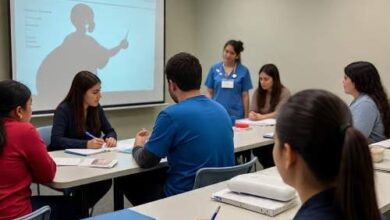Complete Guide: NOC 3012 Canada PR Requirements for Internationally Educated Nurses 2025

Complete Guide: NOC 3012 Canada PR Requirements for Internationally Educated Nurses 2025
Canada continues to be one of the top destinations for healthcare professionals, especially nurses, who are looking to advance their careers while securing permanent residency. For internationally educated nurses, understanding the NOC 3012 Canada PR requirements is an essential first step toward immigration success in 2025.

NOC 3012, which represents Registered Nurses and Registered Psychiatric Nurses in Canada’s National Occupational Classification system, is officially recognized as a high-demand occupation across the country. This classification makes nurses a priority group under Canada’s immigration pathways, particularly through Express Entry and Provincial Nominee Programs (PNPs).
In 2025, the Canadian government continues to streamline immigration policies to address the nationwide shortage of nurses in hospitals, long-term care facilities, and community health centers. By meeting the criteria outlined under NOC 3012, internationally educated nurses have a strong advantage in securing invitations to apply for permanent residency. These requirements typically cover education equivalency, language proficiency, proof of professional experience, and in some cases, licensing steps such as evaluation through the National Nursing Assessment Service (NNAS).
What makes NOC 3012 especially attractive for nurses is that a job offer is not always required to qualify for immigration. Instead, applicants are assessed based on their skills, qualifications, and ability to contribute to Canada’s healthcare workforce. Candidates with competitive Comprehensive Ranking System (CRS) scores and those who align with targeted healthcare draws have excellent opportunities to obtain permanent residency more quickly.
This guide will break down everything you need to know about the NOC 3012 Canada PR requirements, including eligibility, Express Entry and PNP options, language and credential evaluations, and tips to maximize your chances of success. Whether you are just beginning your nursing career abroad or already have years of experience, this step-by-step resource will provide the clarity you need to navigate Canada’s immigration system confidently in 2025.
Easy Guide: Canada Permanent Resident Visa for Registered Nurses Without Job Offer 2025
Understanding NOC 3012: What It Means for Nurses
The National Occupational Classification (NOC) is Canada’s official system for categorizing jobs based on industry, skill level, and responsibilities. For internationally educated nurses, understanding where their profession falls in this system is essential because immigration pathways like Express Entry and Provincial Nominee Programs (PNPs) often target candidates based on their NOC code.
In 2025, NOC 3012 refers to Registered Nurses (RNs) and Registered Psychiatric Nurses (RPNs). This occupation is classified as a TEER 1 category under the updated NOC structure, which means it is recognized as a skilled profession requiring a university degree in nursing or an equivalent qualification from another country.
Nurses under NOC 3012 typically perform the following responsibilities:
-
Assessing patients’ health, recording medical histories, and developing care plans.
-
Administering medications, monitoring treatments, and evaluating patient progress.
-
Collaborating with doctors, specialists, and other healthcare professionals.
-
Providing education and support to patients and their families about health management.
-
Supervising licensed practical nurses, nursing assistants, or healthcare aides.
Because of Canada’s growing healthcare needs and the shortage of qualified nursing professionals, NOC 3012 is consistently flagged as a high-demand occupation across provinces. This demand translates into higher chances of receiving an Invitation to Apply (ITA) under Express Entry draws that prioritize healthcare workers, as well as targeted PNP nominations.
For internationally educated nurses, being aligned with NOC 3012 is a major advantage. It not only confirms that your nursing qualifications are recognized but also positions you within a priority stream for permanent residency applications in 2025.
How to Get Canada PR for Nurses in 2025: Express Easy Step-by-Step
Eligibility Criteria Under NOC 3012 Canada PR Requirements
To qualify for permanent residency as a registered nurse under NOC 3012, internationally educated nurses must meet specific requirements set by Immigration, Refugees and Citizenship Canada (IRCC). These criteria ensure that applicants possess the education, skills, and professional background necessary to contribute effectively to Canada’s healthcare system.

Below are the main eligibility requirements in 2025:
1. Educational Requirements
-
A bachelor’s degree in nursing or an equivalent foreign credential is required.
-
Applicants must obtain an Educational Credential Assessment (ECA) from a recognized body such as WES, IQAS, or CES to verify that their qualifications are equivalent to Canadian standards.
2. Work Experience
-
At least one year of continuous, full-time paid experience (or the part-time equivalent) as a registered nurse or registered psychiatric nurse within the last 10 years.
-
Work experience must match the job duties listed under NOC 3012, including patient assessment, care planning, medication administration, and health education.
3. Language Proficiency
-
A minimum score of CLB 7 in either English or French is required.
-
Acceptable language tests include IELTS General Training, CELPIP General, TEF Canada, or TCF Canada.
4. Proof of Funds
-
Applicants must show sufficient settlement funds as outlined by IRCC, unless they already have a valid job offer in Canada.
5. Licensing Considerations
-
While licensing through the National Nursing Assessment Service (NNAS) and the provincial nursing regulator is not required to apply for PR, it will be essential before starting practice in Canada.
6. Admissibility Requirements
-
Applicants must undergo medical exams and police clearance checks to confirm they are admissible to Canada.
Meeting these NOC 3012 Canada PR requirements is the foundation for a strong application. Candidates who also score well in the Comprehensive Ranking System (CRS) or qualify for healthcare-focused draws have an even higher chance of success.
Proven Guidelines: How to Prepare for CELBAN Speaking in Canada (2025)
Express Entry Pathway for Nurses Under NOC 3012
The Express Entry system remains the fastest and most popular pathway for internationally educated nurses seeking permanent residency in Canada under NOC 3012. This online system manages applications for three major federal immigration programs:
1. Federal Skilled Worker Program (FSWP)
-
Designed for skilled workers outside Canada.
-
Nurses with foreign education and work experience can apply through this stream.
-
Candidates are assessed based on age, education, work experience, language proficiency, and adaptability.
2. Canadian Experience Class (CEC)
-
For nurses who have already gained at least one year of skilled nursing experience in Canada.
-
This pathway is ideal for internationally educated nurses who entered Canada on a work permit or study permit and later transitioned into healthcare jobs.
3. Category-Based Express Entry Draws (Healthcare Focus)
-
Since 2023, IRCC has conducted targeted Express Entry draws for specific occupations, including nurses under NOC 3012.
-
These draws prioritize healthcare workers even with lower Comprehensive Ranking System (CRS) scores compared to general draws.
-
In 2025, these category-based selections continue to provide a significant advantage for nurses, making permanent residency more attainable.
How the Process Works
-
Create an Express Entry profile with all required details, including ECA, language test results, and work history.
-
Get placed into the Express Entry pool and receive a CRS score.
-
Wait for an Invitation to Apply (ITA) during either a general draw or a healthcare-targeted draw.
-
Submit a complete PR application within 60 days after receiving the ITA.
For internationally educated nurses, Express Entry is not just about meeting the NOC 3012 Canada PR requirements but also about maximizing CRS points. Factors like higher language scores, Canadian education, and provincial nominations can significantly improve the chances of receiving an ITA.
Provincial Nominee Program (PNP) Options for Nurses Under NOC 3012
While Express Entry is the most common pathway for nurses, the Provincial Nominee Program (PNP) offers another excellent route for internationally educated nurses under NOC 3012. Provinces and territories across Canada have their own immigration streams designed to address local labor market needs.

Since registered nurses and psychiatric nurses are in high demand nationwide, many provinces actively invite candidates even if they don’t yet have a job offer in Canada.
Key PNP Options for Nurses in 2025
-
Ontario Immigrant Nominee Program (OINP)
-
Ontario frequently issues Healthcare Professional draws under its Human Capital Priorities Stream.
-
Nurses under NOC 3012 are a top priority, and having Express Entry eligibility gives applicants an extra advantage.
-
-
British Columbia Provincial Nominee Program (BC PNP)
-
BC offers targeted Skills Immigration and Express Entry BC streams for healthcare professionals.
-
Registered nurses and psychiatric nurses often receive priority invitations without needing high CRS scores.
-
-
Nova Scotia Nominee Program (NSNP)
-
Nova Scotia regularly conducts targeted draws for nurses under its Labour Market Priorities Stream.
-
Applicants do not always need a job offer, making it a practical option for internationally educated nurses.
-
-
Alberta Advantage Immigration Program (AAIP)
-
Alberta frequently invites healthcare professionals through its Express Entry stream.
-
Nurses under NOC 3012 are highlighted as high-demand workers, giving them an edge even with lower CRS scores.
-
-
Manitoba Provincial Nominee Program (MPNP)
-
Manitoba’s Skilled Worker Overseas stream allows internationally educated nurses with family connections or work experience in Manitoba to apply.
-
-
Saskatchewan Immigrant Nominee Program (SINP)
-
Saskatchewan actively recruits nurses through its Occupations In-Demand and Express Entry streams.
-
NOC 3012 is consistently listed among the targeted in-demand occupations.
-
Why PNP Matters for Nurses
A provincial nomination adds 600 CRS points to an Express Entry profile, virtually guaranteeing an Invitation to Apply (ITA) for permanent residency. For nurses who may not meet the cutoff in general draws, the PNP route provides a faster and more reliable pathway to Canada.
Best Guide: Which English Test is Easier CELBAN or IELTS for Nurses in Canada 2025
Document Checklist for NOC 3012 PR Applications
Preparing the right documentation is one of the most important steps for internationally educated nurses applying for permanent residency under NOC 3012. Missing or incomplete paperwork can cause delays—or even rejection—of your application. Below is a detailed checklist of documents required in 2025:
1. Identity & Civil Status Documents
-
Valid passport (all pages, including stamps and visas).
-
Birth certificate.
-
Marriage certificate, divorce certificate, or death certificate (if applicable).
-
Proof of name change (if applicable).
2. Educational Documents
-
Nursing degree, diploma, or certificate.
-
Transcripts of academic records.
-
Educational Credential Assessment (ECA) from a designated body such as WES, IQAS, CES, or ICES.
3. Work Experience Proof
-
Reference letters from employers on official letterhead confirming your role, job duties (matching NOC 3012), dates of employment, and hours worked.
-
Payslips or contracts as supporting evidence.
4. Language Proficiency Results
-
IELTS General Training or CELPIP General (for English).
-
TEF Canada or TCF Canada (for French).
-
Results must be less than two years old at the time of application.
5. Proof of Funds
-
Official bank statements, fixed deposits, or investment certificates showing settlement funds required by IRCC.
-
Must be in your name or your spouse’s (if applicable).
6. Medical Examination
-
Upfront medical exam report from a panel physician approved by IRCC.
7. Police Certificates
-
Police clearance certificates from every country where you have lived for six months or more since age 18.
8. Express Entry & PNP Supporting Documents
-
Confirmation of Express Entry profile (if applicable).
-
Provincial Nomination Certificate (if nominated under a PNP).
9. Other Supporting Documents
-
Updated résumé (following Canadian standards).
-
Proof of relationships in Canada (if applying with family ties).
-
Digital photographs that meet IRCC’s specifications.
Being well-prepared with this checklist will not only make your application process smoother but also improve your chances of faster approval under the NOC 3012 Canada PR requirements.
Step-by-Step Process to Apply for Canada PR Under NOC 3012
Applying for permanent residency as a registered nurse under NOC 3012 can seem overwhelming, but breaking it into clear steps makes the process much easier.

Below is the structured application process in 2025:
Step 1: Check Your Eligibility
-
Review the NOC 3012 Canada PR requirements for education, work experience, and language.
-
Use the Comprehensive Ranking System (CRS) calculator on the IRCC website to estimate your score.
Step 2: Get Your Educational Credential Assessment (ECA)
-
Apply to a designated body such as WES, IQAS, CES, or ICES to verify your nursing degree or diploma.
-
Keep your ECA report ready before creating an Express Entry profile.
Step 3: Complete a Language Test
-
Take IELTS General Training or CELPIP General for English, or TEF Canada/TCF Canada for French.
-
Aim for at least CLB 7 to qualify, but higher scores can boost your CRS points.
Step 4: Create Your Express Entry Profile
-
Submit your ECA, language test scores, and work experience details.
-
Your profile will be entered into the Express Entry pool and ranked according to CRS.
Step 5: Explore Provincial Nominee Programs (PNPs)
-
Apply to provinces actively inviting nurses (Ontario, British Columbia, Nova Scotia, etc.).
-
If nominated, you’ll get 600 extra CRS points, almost guaranteeing an Invitation to Apply (ITA).
Step 6: Receive an Invitation to Apply (ITA)
-
Wait for IRCC to conduct either a general Express Entry draw or a healthcare-targeted draw.
-
Once selected, you’ll receive an ITA for permanent residency.
Step 7: Submit Your PR Application
-
Within 60 days of receiving an ITA, submit your complete application with supporting documents, medicals, and police certificates.
Step 8: Application Processing & Decision
-
IRCC processes most Express Entry applications within 6 months.
-
You may be asked for additional documents during this stage.
Step 9: Get Your Confirmation of Permanent Residence (COPR)
-
Once approved, you’ll receive a COPR and can officially move to Canada as a permanent resident.
Step 10: Prepare for Licensing in Canada
-
While not needed for immigration, you must complete your NNAS evaluation and register with your provincial nursing regulator before practicing as a nurse in Canada.
This step-by-step process ensures you stay on track and meet all the requirements while applying for permanent residency under NOC 3012.
Tips to Increase Your Chances of Success Under NOC 3012
While meeting the NOC 3012 Canada PR requirements is essential, standing out in the competitive Express Entry pool requires additional strategies. Here are proven ways to improve your chances of securing permanent residency as an internationally educated nurse in 2025:
1. Aim for Higher Language Scores
-
Although the minimum requirement is CLB 7, achieving CLB 9 or above in IELTS or CELPIP can significantly boost your CRS score.
-
Consider retaking the test if your initial results are below target.
2. Get a Provincial Nomination (PNP)
-
Apply to provinces with healthcare-focused draws.
-
A nomination adds 600 CRS points, almost guaranteeing an Invitation to Apply (ITA).
3. Consider French as a Second Language
-
Bilingual candidates receive additional CRS points.
-
Even basic proficiency in French can give you an edge, especially in provinces like Ontario, Manitoba, and New Brunswick.
4. Gain Canadian Experience if Possible
-
Working in Canada temporarily on a work permit can make you eligible for the Canadian Experience Class (CEC) stream.
-
Even one year of Canadian nursing experience greatly increases your PR success rate.
5. Further Education or Certifications
-
Completing post-graduate courses or certifications in specialized nursing fields (e.g., critical care, psychiatric nursing) can improve your profile.
-
This shows higher qualifications and adaptability to the Canadian healthcare system.
6. Keep Your Documents Ready
-
Ensure your ECA, language results, and reference letters are up to date.
-
Being prepared helps you apply quickly when targeted draws are announced.
7. Leverage Family Ties or Job Offers
-
If you have relatives in Canada or secure a valid job offer, you can claim additional CRS points.
-
This increases your competitiveness in the pool.
By combining these strategies with the NOC 3012 Canada PR requirements, internationally educated nurses can maximize their chances of obtaining permanent residency in Canada in 2025.
Life After PR: Nursing Careers and Opportunities in Canada
Securing permanent residency through NOC 3012 is just the beginning of a rewarding journey. Once internationally educated nurses become permanent residents, they gain access to not only career growth but also long-term stability and opportunities in Canada’s healthcare system.
1. Employment Opportunities
-
Nurses are in high demand across Canada, with hospitals, long-term care facilities, community clinics, and mental health centers all actively hiring.
-
Provinces such as Ontario, British Columbia, Alberta, and Nova Scotia are particularly in need of registered nurses and psychiatric nurses.
-
PR status makes it easier to compete for jobs, as employers prefer candidates who already have the legal right to live and work in Canada.
2. Provincial Licensing Requirements
-
To practice as a nurse, internationally educated nurses must complete the NNAS evaluation and register with a provincial regulatory body such as:
-
CNO – College of Nurses of Ontario.
-
BCCNM – British Columbia College of Nurses and Midwives.
-
CRNA – College of Registered Nurses of Alberta.
-
-
Most nurses will also need to pass the NCLEX-RN exam before beginning practice.
3. Salary Expectations
-
Average salaries for registered nurses in 2025 range from CAD $70,000 to $100,000 annually, depending on province, experience, and specialization.
-
Psychiatric nurses may also earn competitive salaries, especially in provinces with growing demand for mental health professionals.
4. Pathway to Citizenship
-
After living in Canada as a permanent resident for three years out of five, nurses become eligible to apply for Canadian citizenship.
-
This offers additional benefits, including the right to vote, apply for a Canadian passport, and access more international opportunities.
5. Quality of Life Benefits
-
PR holders enjoy access to universal healthcare, free public education for children, and social benefits.
-
Nurses and their families can settle in safe communities with excellent infrastructure and cultural diversity.
For many internationally educated nurses, obtaining permanent residency under NOC 3012 not only fulfills career goals but also provides a secure future for their families.
Pediatric Nurses in Canada Are Earning Unbelievable Salaries in 2025 – See the Full Breakdown
Conclusion
For internationally educated nurses, the NOC 3012 Canada PR requirements in 2025 provide a clear and achievable pathway to building a professional and personal future in Canada. With nursing listed as a high-demand occupation nationwide, qualified nurses have an advantage in both Express Entry and Provincial Nominee Programs. By meeting the eligibility criteria, preparing the required documents, and strategically improving factors such as language proficiency or provincial nomination, nurses can significantly increase their chances of obtaining permanent residency.
Beyond immigration, Canada offers internationally educated nurses more than just jobs—it provides long-term career stability, competitive salaries, and the opportunity to contribute to a world-class healthcare system. The benefits of PR also extend to family members, ensuring access to quality education, healthcare, and a secure pathway to citizenship.
If you are a nurse exploring opportunities abroad, now is the ideal time to take action. The demand for healthcare professionals is at its peak, and the Canadian government continues to prioritize registered nurses under targeted draws. By starting your application process today, you could be one step closer to living and working in Canada as a permanent resident.
Resources for NOC 3012 Canada PR Requirements
If you are an internationally educated nurse planning to immigrate to Canada, the following official resources will guide you through each step of the process:
-
Immigration, Refugees and Citizenship Canada (IRCC) – Official government website for PR programs, Express Entry, and PNP details.
https://www.canada.ca/en/immigration-refugees-citizenship.html -
National Nursing Assessment Service (NNAS) – Credential evaluation body for internationally educated nurses seeking Canadian licensure.
https://www.nnas.ca/ -
World Education Services (WES) Canada – Approved organization for Educational Credential Assessments (ECA) needed for Express Entry.
https://www.wes.org/ca/ -
Express Entry System (IRCC Express Entry Portal) – Create and manage your Express Entry profile here.
https://www.canada.ca/en/immigration-refugees-citizenship/services/immigrate-canada/express-entry.html -
IELTS – International English Language Testing System – Approved English language proficiency test for Canada PR.
https://www.ielts.org/ -
CELPIP – Canadian English Language Proficiency Index Program – Alternative approved English test for PR applicants.
https://www.celpip.ca/ -
College of Nurses of Ontario (CNO) – For internationally educated nurses applying to work in Ontario.
https://www.cno.org/ -
British Columbia College of Nurses and Midwives (BCCNM) – For those planning to work in British Columbia.
https://www.bccnm.ca/ -
Canadian Nurses Association (CNA) – Professional association supporting nurses across Canada.
https://www.cna-aiic.ca/ -
Job Bank Canada – Official job portal listing nursing jobs across all provinces.
https://www.jobbank.gc.ca/
Frequently Asked Questions (FAQs) About NOC 3012 Canada PR Requirements
Answer: NOC 3012 refers to the National Occupational Classification code for Registered Nurses (RNs) and Registered Psychiatric Nurses in Canada. It identifies nursing as a high-demand profession eligible for Express Entry and many Provincial Nominee Programs (PNPs).
Answer: Yes. Registered nurses under NOC 3012 can apply for Canada PR through the Express Entry Federal Skilled Worker Program (FSWP) without a job offer, provided they meet the minimum points requirements. However, having a job offer can increase CRS scores.
Answer: The main requirements include:
Educational Credential Assessment (ECA).
Language test results (IELTS/CELPIP for English or TEF for French).
Work experience as a registered nurse.
Proof of funds (if no job offer).
Valid Express Entry profile.
Answer: The required Comprehensive Ranking System (CRS) score changes with each draw. In 2025, nurses in targeted healthcare draws may qualify with lower CRS scores (typically around 450–490 points), depending on the program.
Answer: No. Licensing through the NNAS (National Nursing Assessment Service) is required to practice as a nurse in Canada, but it is not required to apply for PR. Many applicants complete licensing after receiving PR.
Answer: Provinces with high demand for nurses include Ontario, British Columbia, Alberta, Nova Scotia, and Manitoba. Many of these provinces offer dedicated PNP streams for healthcare professionals.




3 Comments